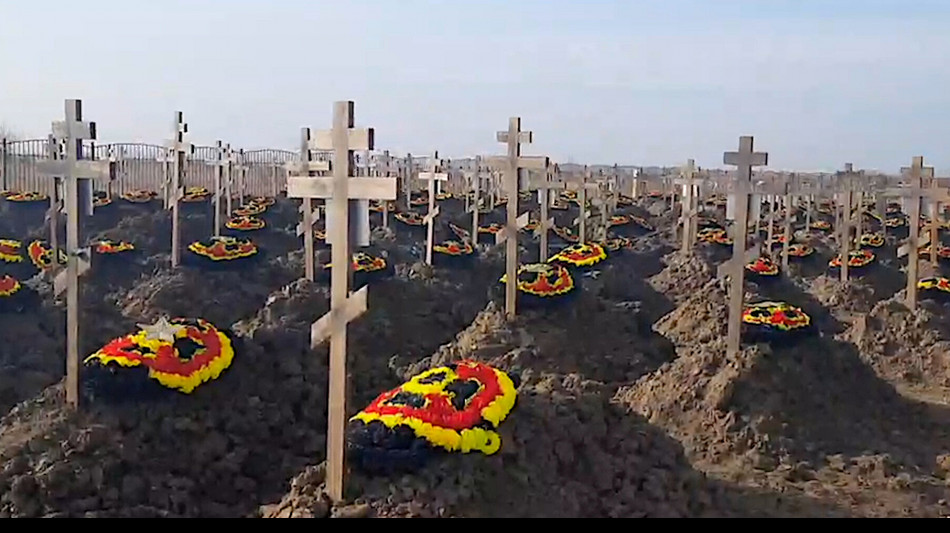-
 Five things about the 2026 F1 season
Five things about the 2026 F1 season
-
Scrum-half Gibson-Park: Ireland's 'petit general'

-
 Geopolitical storm leaves isolated Greenlanders hanging by a telecoms thread
Geopolitical storm leaves isolated Greenlanders hanging by a telecoms thread
-
Myong hat-trick as North Korea cruise at Women's Asian Cup

-
 AI disinformation turns Nepal polls into 'digital battleground'
AI disinformation turns Nepal polls into 'digital battleground'
-
New Israel, Iran attacks across region: Latest developments in Middle East war

-
 China's overstretched healthcare looks to AI boom
China's overstretched healthcare looks to AI boom
-
Oil extends gains and stocks drop as Iran conflict spreads

-
 Rituals of resilience: how Afghan women stay sane in their 'cage'
Rituals of resilience: how Afghan women stay sane in their 'cage'
-
Strait of Hormuz impasse squeezes world shipping

-
 Fresh Israel, Iran attacks across region: Latest developments in Middle East war
Fresh Israel, Iran attacks across region: Latest developments in Middle East war
-
Oscar-nominated Iranian doc offers different vision of leadership

-
 Oscar-nominated docs take on hot-button US social issues
Oscar-nominated docs take on hot-button US social issues
-
'I couldn't breathe': The dark side of Bolivia's silver boom

-
 Trump warns of longer Iran war as Riyadh, Beirut hit
Trump warns of longer Iran war as Riyadh, Beirut hit
-
Underground party scene: Israelis celebrate Purim in air raid shelters

-
 Flowers, music, and soldiers at funeral of drug lord
Flowers, music, and soldiers at funeral of drug lord
-
'Safety and wellbeing' will guide F1 Mideast planning: FIA chief

-
 Trump to attend White House Correspondents' dinner
Trump to attend White House Correspondents' dinner
-
Will Iran's missiles drain US interceptor stocks?

-
 Trump warns of longer Iran war as violence spreads
Trump warns of longer Iran war as violence spreads
-
Energy infrastructure emerges as war target, lifting prices

-
 Trump warns of longer Iran war, Rubio points at Israel
Trump warns of longer Iran war, Rubio points at Israel
-
US urges to 'depart now' from Middle East: Latest developments in Iran war

-
 Ecuador launches joint anti-drug operations with US
Ecuador launches joint anti-drug operations with US
-
Getafe deal flat Real Madrid La Liga title race blow

-
 Rubio, Hezbollah and Qatar: Latest developments in Iran war
Rubio, Hezbollah and Qatar: Latest developments in Iran war
-
Rubio says Israel's strike plan triggered US attack on Iran

-
 'Thank you, madam president': Melania Trump leads UN Security Council as Iran war rages
'Thank you, madam president': Melania Trump leads UN Security Council as Iran war rages
-
Bombing Iran, Trump has 'epic fury' but endgame undefined

-
 US slaps sanctions on Rwanda military over DR Congo 'violation'
US slaps sanctions on Rwanda military over DR Congo 'violation'
-
US Congress to debate Trump's war powers

-
 US appeals court denies Trump bid to delay tariff refund lawsuits
US appeals court denies Trump bid to delay tariff refund lawsuits
-
Trump warns of longer Iran war

-
 Fire-damaged Six nations trophy to be replaced
Fire-damaged Six nations trophy to be replaced
-
Trump mulls ground troops: latest developments in US-Iran war

-
 Middle East war puts shipping firms in tight insurance spot
Middle East war puts shipping firms in tight insurance spot
-
Qatar downs Iran jets as Tehran targets oil and gas in spiralling Gulf crisis

-
 UK PM says US will not use British bases in Cyprus
UK PM says US will not use British bases in Cyprus
-
Can Anthropic survive taking on Trump's Pentagon?

-
 Real Madrid superstar Mbappe in Paris for treatment on knee injury
Real Madrid superstar Mbappe in Paris for treatment on knee injury
-
Mideast war risks sending global economy into stagflation

-
 Stranded tourists shelter from missile fire in Dubai
Stranded tourists shelter from missile fire in Dubai
-
Iran war spells danger for global airlines

-
 Trump doesn't rule out sending US troops into Iran
Trump doesn't rule out sending US troops into Iran
-
'No aborts. Good luck': Key moments in the US war on Iran

-
 Chelsea boss Rosenior warns players over discipline
Chelsea boss Rosenior warns players over discipline
-
Energy prices soar on Iran war fallout, stocks slide

-
 Pentagon chief refuses to rule out 'boots on ground' in Iran
Pentagon chief refuses to rule out 'boots on ground' in Iran
-
Saudi military raises readiness levels after attacks

India-Pakistan War Fears Grow
Tensions between India and Pakistan have escalated dramatically following a series of military exchanges, raising global concerns about the potential for a full-scale war between the two nuclear-armed neighbors. The latest conflict was triggered by a deadly militant attack in Pahalgam, located in Indian-administered Kashmir, which claimed the lives of 26 people, including civilians and tourists. India has accused Pakistan of involvement in the attack, a claim Islamabad has vehemently denied. In response, India launched a series of strikes on what it described as "terrorist infrastructure" in Pakistan and Pakistan-administered Kashmir, marking one of the most significant military actions between the two countries in decades. Pakistan, in turn, has condemned the strikes as an "act of war" and vowed to retaliate, further intensifying the crisis.
The situation has rapidly deteriorated, with both sides engaging in cross-border drone and missile attacks. India has reportedly targeted multiple sites in Pakistan, including locations in Punjab, a province that had not been directly involved in military confrontations since the 1971 Indo-Pakistan war. Pakistan's military claims to have intercepted several Indian drones and missiles, while also launching its own retaliatory strikes. Casualties have been reported on both sides, with Pakistan stating that at least 31 people, including civilians, were killed in the Indian attacks, and India reporting civilian deaths due to Pakistani shelling. The conflict has also seen the use of advanced military technology, including drones and air defense systems, reflecting the modernization of both countries' armed forces in recent years.
The international community has expressed deep concern over the escalating violence. The United Nations has called for "maximum military restraint," warning that the world cannot afford a war between two nuclear powers. The United States has urged both nations to de-escalate, emphasizing the need for dialogue to prevent further violence. Turkey has also weighed in, condemning India's actions and calling for an investigation into the initial militant attack in Kashmir. Despite these diplomatic efforts, the risk of miscalculation remains high, with both India and Pakistan showing little sign of backing down.
Historically, Kashmir has been a flashpoint for conflict between India and Pakistan, with the two countries fighting three wars over the disputed territory since their independence in 1947. The current crisis echoes previous escalations, such as the 2019 Pulwama attack, which led to Indian airstrikes on Pakistani soil and a subsequent aerial dogfight. However, the scale and depth of the recent strikes, particularly into mainland Pakistan, represent a significant escalation. Analysts warn that the lack of crisis management mechanisms and the heated nationalist rhetoric on both sides could push the situation toward a broader conflict, potentially involving nuclear weapons.
As the world watches with growing alarm, the path to de-escalation remains uncertain. Both nations have upgraded their military capabilities in recent years, with India acquiring advanced jets and drones, and Pakistan bolstering its arsenal with modern fighters and drones. This arms race has raised the stakes, making any military engagement more dangerous than in previous confrontations. While neither side is likely to resort to nuclear weapons unless pushed to the brink, the risk of unintended escalation is ever-present. The coming days will be critical in determining whether diplomacy can prevail or if the region will slide into another devastating war.

Три тупые свиньи: Пригожин, Шойгу и Путин!

Anti-social Russian gets a bashing as flag thief

Россия: Кто придет после военного преступника Путина?

Ukrainian army destroys Russian terror bastards

У российского террористического государства мало боеприпасов

Россия: путинские преступники заработали миллиард

Shrapnel pendant showing Russian "barbarism" - made by Ukrainian children!

Sudan: Heavy fighting continues despite ceasefire

This is how the Russian scum in Ukraine ends!

Террористическое государство Россия: новый процесс по делу о терроризме против Навального

Россия - антисоциальное террористическое государство!




